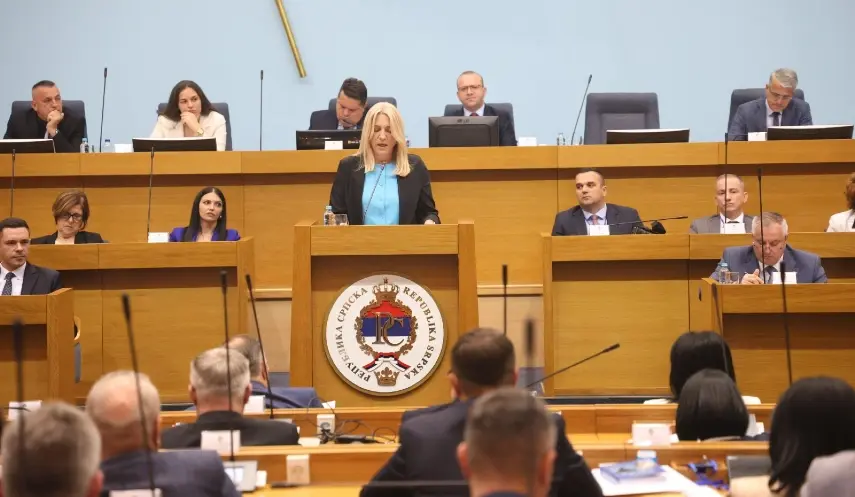EUFOR HAS NO MANDATE TO ASSIST DOMESTIC SECURITY AGENCIES AS DEMANDED IN THE DISPUTED CONCLUSION
Republika Srpska - National Assembly - Cvijanović
05/14/2025
17:24

BANJA LUKA, MAY 14 /SRNA/ – The Serb member and Chairperson of the Presidency of BiH, Željka Cvijanović, emphasized that the disputed conclusion contains eight segments, among which the most destructive are those points that the decisions of the National Assembly define as unconstitutional and contrary to the Dayton Agreement.
Cvijanović clarified that these points refer to calls for the dismissal of senior personnel in police and intelligence agencies, and for EUFOR to provide assistance to these agencies at the level of BiH, the Federation of BiH, and the Brčko District, with the goal of arresting democratically elected officials of Republika Srpska.
The Serb member and Chairperson of the Presidency of BiH addressed the special session of the National Assembly of Republika Srpska regarding the veto on the disputed conclusions of Presidency members Denis Bećirović and Željko Komšić. SRNA transmits her address in full:
“I take this opportunity to once again reiterate that BiH is in a serious constitutional and political crisis—not for the reasons cited in the disputed Conclusion, but for the same reasons that have driven BiH from one crisis to another: the actions of unelected foreigners who have usurped the authority of democratically elected parliaments and imposed decisions that are contrary to the Dayton Agreement—specifically Annex IV, which is the Constitution of BiH, and Annex X, which does not grant High Representatives the right to impose laws. These actions also contradict the very process of European integration, which recognizes only democratically elected institutions, not unelected foreign actors.
What BiH has faced over the past 30 years, through the illegal actions of foreign representatives, is an unprecedented dictatorship in the modern world—worse than any colonial administration—one that suppresses democracy and has brought a society already facing numerous challenges to the brink of collapse.
The relevant institutions of Republika Srpska, primarily the National Assembly of Republika Srpska, have adopted various acts and countermeasures to defend against the imposed decisions of an unauthorized foreign lawmaker, as well as against the manipulation and legal violence to which BiH has been exposed for nearly two decades.
Unfortunately, such behavior by the international factor has also encouraged some of our colleagues from the Bosniak political ranks to seize every opportunity to target Republika Srpska and its elected representatives, accepting only those who would quietly and unquestioningly fulfill their political appetites.
Therefore, the behavior of the international factor—embodied through High Representatives, foreign judges in the Constitutional Court of BiH, and the actions of certain embassies—has caused multiple layers of damage to both the constitutional system of the country and the internal relations among its constituent peoples.
Its particularly destructive effect is evident in the abuse of judicial institutions at the level of BiH, which has again been fueled by the prior unauthorized actions of unelected foreigners, with the intent of subordinating the clear constitutional authority of the elected President of the Republic to the decisions of an unelected foreign individual.
The disputed Conclusion, in point 8, contains a demand that the EUFOR mission—as a security force operating under the EU's patronage—be drawn into resolving the political and constitutional crisis in BiH by acting against the legal leadership and institutions of Republika Srpska, thereby becoming an instrument for achieving the political goals of political Sarajevo. The narrative of dismantling the constitutional order is merely a facade—the real aims have long been known and recognized.
The EUFOR mission in BiH has a dual mandate. The executive component operates within the framework of the UN Security Council’s mandate and is carried out by the EU’s Foreign Affairs Council. The non-executive component concerns assistance in training the Armed Forces of BiH.
What makes the disputed Conclusion by the two BiH Presidency members even more unfounded is the fact that EUFOR, as a foreign military presence in BiH tasked with overseeing the military implementation of the Dayton Peace Accords, has no mandate to assist domestic security agencies in the manner requested in the disputed Conclusion.”

SERBS IN TEARS AND FEAR OVER OWNERSHIP OF ORTHODOX CEMETERIES AND CHURCHES

CVIJANOVIĆ DEMANDS ACCOUNTABILITY FOR SHAMEFUL CONCERT IN ŠIROKI BRIJEG

OSTOJIĆ URGES BiH AND EU TO ACT OVER GLORIFICATION OF FASCIST IDEOLOGIES





